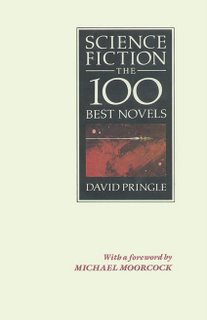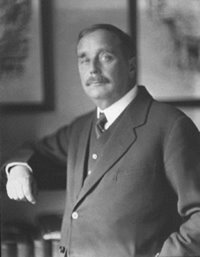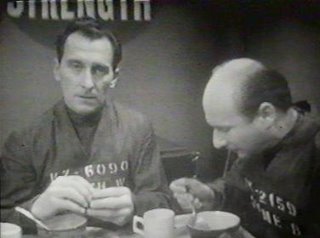Das Projekt
For some time now I’ve wanted to read the books listed in David Pringle’s Science Fiction: The 100 Best Novels in order. Pringle’s list appeals to me for several reasons. First, he’s clearly a fan of literature from the social schools of sf writing, including the New Wave of the 60s and 70s. I’m also a fan, so the list includes several of my favorites—Bester, Dick, Ballard, Disch... He also has several selections from “literary” authors like Orwell, Burroughs, and Vonnegut. That’s great. What interests me most in writing—the relationship between humans and technology, political agendas, power dynamics, modern myth, good narratives—can come from any genre or space on the literary shelf. If it’s interesting, it’s interesting. I’ve also wanted to use the list because I’ve never read several of the titles on it. Shamefully, for instance, I’ve read no novels (only short stories) by some of the real legends—Frederik Pohl and Theodore Sturgeon (shame, shame) are two good examples and are both represented. I also like the fact that Pringle lists his selections chronologically. No fanboy fighting over the greatest this or that, and by reading them in order perhaps some understanding of the genre’s development will become apparent. Beyond all that, I like Pringle’s other work. He’s done a lot for the genre, and (perhaps since he’s a Scotsman) he has a nice balance present here between American and British sf.

Now Pringle published the list in 1985, so the most recent novel on it is Neuromancer. That’s a little disappointing, but it doesn’t bother me as much as the fact that the first novel on the list is 1984, which was published in 1949. Thus, none of the great pulp fiction of the first half of the 20th century is to be found, and, of course, there’s nothing from the grandfather of the genre, H.G. Wells. But no list of this type is perfect.

The timetable I’ve set for myself is roughly two years. I just started 1984, and I hope to finish Neuromancer by the next presidential election (perhaps all the dystopian literature on the list will give me some perspective!). That’s basically a novel a week with a break here and there. Not too difficult. I thought about giving myself a year, but I don’t think I would be able to read much other than what’s on this list if I did. That seems a recipe for giving up on it. But the real incentive is posting my reviews and thoughts here. Okay, I’m off for a date with Winston Smith and Big Brother…



